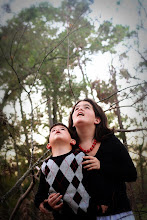Re-post from last February! Feel Free to Leave Comments on Your View of Lent or What your Family does to Observe it!
This is an article I found that was pretty interesting. I really want to observe Lent, NEVER did before, until Taylor's private school introduced us to it two years ago. I think, for me and my family, we will observe Lent, talk about it and focus more on our walk with God during this season. If we decide that walk means fasting or giving up something we will, but for us, we pray we keep our heart on The Lord all through out the year.
This is an article I found that was pretty interesting. I really want to observe Lent, NEVER did before, until Taylor's private school introduced us to it two years ago. I think, for me and my family, we will observe Lent, talk about it and focus more on our walk with God during this season. If we decide that walk means fasting or giving up something we will, but for us, we pray we keep our heart on The Lord all through out the year.
I have been researching on Lent and Baptists. This article struck me the most and I will share more if I find more that interests me and I wish everyone the best of luck, peace and happiness throughout this season of Lent.
The article:
Baptists and Lent…
Posted on February 23, 2009 by baptistparson
In the news media and perhaps from some of your non-Baptist friends, you will hear about “Fat Tuesday” (a.k.a. “Shrove Tuesday”) and “Ash Wednesday” this week.Why, Tuesday is even “National Pancake Day!“
We have come to the beginning of the Lenten season. Just who observes Lent, and who doesn’t in the Christian family of denominations? Do Baptists observe Lent?
The short hand answer to our main question is “no, most Baptists don’t.” But clarification is in order. Among those who do not practice the Lenten fast, there is not an objection to the fasting which is such a prominent part of Lent for other Christian denominations. Lack of widespread participation in Lenten observances by Baptists is probably more due to the fact that it goes against the “individual liberty” gene that runs so strong in the Baptist expression of Christianity. The concept that a centralized church authority should command believers to fast over a certain period is not part of Baptist teaching because Baptists hold that each believer is accountable individually to God in such matters.
Also, most Baptists tend to believe that fasting is a private spiritual matter, based on Matthew 6:16-18.
Baptists do not object to fasting itself, for it is clearly a biblical practice. In the Old Testament, different words and expressions are used to depict fasting. Fasting is often associated with wearing sackcloth and ashes; Moses fasted when receiving the Law (Ex. 34:28), when he broke the tablets because of Israel’s sin (Deut. 9:17ff); fasting was prescribed for the 10th day of the 7th month (Leviticus 16:29). Improper uses of fasting were condemned by Isaiah (58:3-7) and Jeremiah (14:12).
In the New Testament, we learn more about fasting. The Dictionary of New Testament Theology explains that the word fast literally means “having an empty stomach; to practice fasting is to abstain for some period of time from food”.
We read that Jesus fasted (Matt. 4:2). He also stated that His followers would fast once He was ascended (see Matt. 9:14ff). In Acts, prayer was mentioned in conjunction with fasting in 13:3 and 14:23; but there does not appear to be any discussion of fasting in the epistles, except for the personal experience of St. Paul in II Corinthians 6:5 and 11:27.We are also told that Paul fasted in Acts 9:9, 13:2ff, and 27:33.
Fasting continued after the Apostles all died, and it gradually became associated with preparing for baptism and preparing for the annual celebration of Easter. This is when the custom of “Lent” developed, when a forty-day period of fasting came to be observed. Lent comes from an old Anglo-Saxon word “Lenten” which referred to how the days “lengthened” in the Spring. Certain foods were avoided (such as red meat) during this forty-day period.
A period of 40 days of fasting was adopted because Jesus fasted in the wilderness for forty days (Matthew 4). The first day of Lent came to be called “Ash Wednesday” because the worshippers had ashes placed on their foreheads as a sign of repentance and grief over sin. Ashes long had this use in the biblical times, especially in the Old Testament, but we do not find a direct biblical command to incorporate this in our public worship. For this reason, many Protestants tend not to observe the custom. However, since it is not forbidden, we need not be critical of those who do observe the practice. I think it belongs to the spirit of Christian liberty spoken of in Galatians 5.
Fasting can be an important spiritual discipline that helps us know our Lord should be our master, not our belly. Fasting does have a place in the believer’s life. It should not be abused or overdone, and it should never be considered something to merit God’s favor. Fasting is more than not eating.
One of the “church fathers” said (I believe it was John Chrysostom) that the best fasts of all are when we abstain from sin, be it sins involving our words, thoughts or deeds. Maybe we could even think about fasting from television as being as wholesome as say not eating desserts for forty days! Want to know more? You can dig deeper into the history of “Lent” from a conservative, evangelical perspective at
http://www.christianitytoday.com/ch/news/2004/lent.html
©Baptist Parson. All Rights Reserved.
Possibly related posts: (automatically generated)
Fasting, Giving the Gift of Self to God: Papal Message for Lent 2009
Posted on February 23, 2009 by baptistparson
In the news media and perhaps from some of your non-Baptist friends, you will hear about “Fat Tuesday” (a.k.a. “Shrove Tuesday”) and “Ash Wednesday” this week.Why, Tuesday is even “National Pancake Day!“
We have come to the beginning of the Lenten season. Just who observes Lent, and who doesn’t in the Christian family of denominations? Do Baptists observe Lent?
The short hand answer to our main question is “no, most Baptists don’t.” But clarification is in order. Among those who do not practice the Lenten fast, there is not an objection to the fasting which is such a prominent part of Lent for other Christian denominations. Lack of widespread participation in Lenten observances by Baptists is probably more due to the fact that it goes against the “individual liberty” gene that runs so strong in the Baptist expression of Christianity. The concept that a centralized church authority should command believers to fast over a certain period is not part of Baptist teaching because Baptists hold that each believer is accountable individually to God in such matters.
Also, most Baptists tend to believe that fasting is a private spiritual matter, based on Matthew 6:16-18.
Baptists do not object to fasting itself, for it is clearly a biblical practice. In the Old Testament, different words and expressions are used to depict fasting. Fasting is often associated with wearing sackcloth and ashes; Moses fasted when receiving the Law (Ex. 34:28), when he broke the tablets because of Israel’s sin (Deut. 9:17ff); fasting was prescribed for the 10th day of the 7th month (Leviticus 16:29). Improper uses of fasting were condemned by Isaiah (58:3-7) and Jeremiah (14:12).
In the New Testament, we learn more about fasting. The Dictionary of New Testament Theology explains that the word fast literally means “having an empty stomach; to practice fasting is to abstain for some period of time from food”.
We read that Jesus fasted (Matt. 4:2). He also stated that His followers would fast once He was ascended (see Matt. 9:14ff). In Acts, prayer was mentioned in conjunction with fasting in 13:3 and 14:23; but there does not appear to be any discussion of fasting in the epistles, except for the personal experience of St. Paul in II Corinthians 6:5 and 11:27.We are also told that Paul fasted in Acts 9:9, 13:2ff, and 27:33.
Fasting continued after the Apostles all died, and it gradually became associated with preparing for baptism and preparing for the annual celebration of Easter. This is when the custom of “Lent” developed, when a forty-day period of fasting came to be observed. Lent comes from an old Anglo-Saxon word “Lenten” which referred to how the days “lengthened” in the Spring. Certain foods were avoided (such as red meat) during this forty-day period.
A period of 40 days of fasting was adopted because Jesus fasted in the wilderness for forty days (Matthew 4). The first day of Lent came to be called “Ash Wednesday” because the worshippers had ashes placed on their foreheads as a sign of repentance and grief over sin. Ashes long had this use in the biblical times, especially in the Old Testament, but we do not find a direct biblical command to incorporate this in our public worship. For this reason, many Protestants tend not to observe the custom. However, since it is not forbidden, we need not be critical of those who do observe the practice. I think it belongs to the spirit of Christian liberty spoken of in Galatians 5.
Fasting can be an important spiritual discipline that helps us know our Lord should be our master, not our belly. Fasting does have a place in the believer’s life. It should not be abused or overdone, and it should never be considered something to merit God’s favor. Fasting is more than not eating.
One of the “church fathers” said (I believe it was John Chrysostom) that the best fasts of all are when we abstain from sin, be it sins involving our words, thoughts or deeds. Maybe we could even think about fasting from television as being as wholesome as say not eating desserts for forty days! Want to know more? You can dig deeper into the history of “Lent” from a conservative, evangelical perspective at
http://www.christianitytoday.com/ch/news/2004/lent.html
©Baptist Parson. All Rights Reserved.
Possibly related posts: (automatically generated)
Fasting, Giving the Gift of Self to God: Papal Message for Lent 2009






































Cool - thanks for the info. I wondered what determined who observed Lent and who did not. So far so good for me and the no snacking at night thing. :)
ReplyDeleteI am actually going to post on my own blog! HA! I have searched for and longed for some "tradition" in my life. I wondered why I wasn't born into a religion that had more traditional prayers, services and holidays. I yearned for a more "Catholic" approach to religion without being Catholic! Nothing against being Catholic, I am just not Catholic. I have searched high and low and feel I finally found it with the Baptist religion, what I also found in my search was that I could STOP searching for traditions and make my own in my own home. We have celebrated Lent in the past and then we didn't, then we did. Well, we are! We are going to have a traditional "Pancake" dinner and all give up something for Lent. Me, Vitamin Waters, my husband, beer, my daughter (she still has until midnight to decide, and my son, well, maybe Spongebob Squarepants!
ReplyDelete